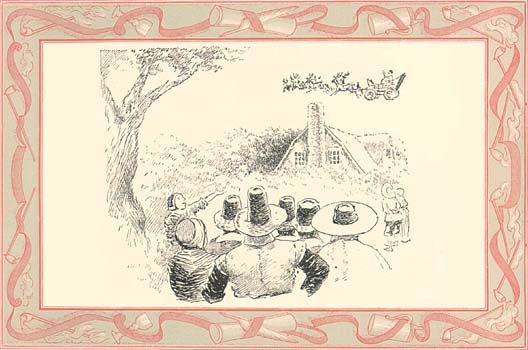
The original names of the reindeer were Dasher, Dancer, Prancer, Vixen, Comet, Cupid, Dunder and Blixem.
Dunder and Blixem??????
Yep.
When the Christmas poem first appeared in the Troy Sentinel in 1823, the reindeer names lines read
Now! Dasher, now! Dancer, now! Prancer, and Vixen,
On! Comet, on! Cupid, on! Dunder and Blixem;
|
|
Be warned, those two lines are a lot more complicated than they look. Over and over I try to get people to
recite them as written and, with almost 100 percent results, they fail. The problem is the rhythm. We know
this rhyme so well, we CAN'T read it as written. We read it as we KNOW it's written. But we DON'T know. That's the problem.
The way we learned to read the lines was
Now, Dasher! now, Dancer! now, Prancer! now Vixen!
On, Comet! on, Cupid! on, Dunder and Blixem!
|
|
Ignoring, of course, the last two funny reindeer names. But that isn't the way the first publication bounces along.
In 1823 they read it as
Now! Dasher, now! Dancer, now! Prancer, and Vixen,
On! Comet, on! Cupid, on! Dunder and Blixem;
|
|
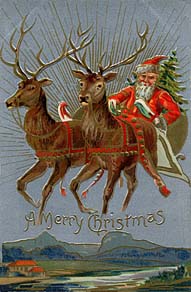 Try reading the difference between those versions a few times. Hard, isn't it? It doesn't bounce right.
Try reading the difference between those versions a few times. Hard, isn't it? It doesn't bounce right.
The problem is that Henry Livingston was a pretty sloppy poet. He wrote fast and he was happy if the general
feel of the poem was right. Details would fix themselves. This problem shows up in his music manuscript, too.
A measure has a certain number of notes, right? Well, not for Henry. He writes fast and he writes A LOT! And
sometimes the number of notes in the measures turns out to be in those pesky details. He would undoubtedly
fix the problem while he was playing his violin or flute. To get the transcriptions for this website, though,
I've had to "fix" Henry's measures again and again.
And that's what editors do to poetry. If they don't like the way it sounds, they "fix" it.
Beats there the heart of an editor that doesn't think they could do a better job than the original writer? Well,
it seems that for Night Before Christmas, the answer is a resounding NO!
Almost every editor who published the Christmas poem changed SOMETHING! Here we're just going to look at
who did what to the reindeer names.
Troy Sentinel, 1823


Now! Dasher, now! Dancer, now! Prancer, and Vixen,
On! Comet, on! Cupid, on! Dunder and Blixem;
|
|
McClure Almanac, 1825
Blixem to Blixen

Now! Dasher, now! Dancer, now! Prancer, and vixen,
On! Comet, on! Cupid, on! Dunder and Blixen;
|
|
Norm Tuttle's Troy Sentinel Broadsheet, 1830



Now, Dasher! now, Dancer! now, Prancer! now, Vixen!
On, Comet! on, Cupid! on, Dunder and Blixem!
|
|
Hoffman's New-York Book of Poetry, 1837
Dunder to Donder; Blixem to Blixen


Now, Dasher! now, Dancer! now, Prancer! now Vixen!
On! Comet, on! Cupid, on! Donder and Blixen--
|
|
Poets of America, 1840
Dunder to Donder; Blixem to Blixen


Now, Dasher! now, Dancer! now, Prancer! now Vixen!
On! Comet, on! Cupid, on! Donder and Blixen--
|
|
Clement Moore's Poems, 1844
Dunder to Donder; Blixem to Blitzen


Handwritten change above is from Troy Sentinel Broadsheet,
and is with Moore's papers in Museum of City of NY
NOTE that this is from a slightly edited version of the 1830
Troy Sentinel Broadsheet,
with the identical design and layout

"Now, Dasher! now, Dancer! now, Prancer and Vixen!
On, Comet! on, Cupid! on, Donder and Blitzen!
|
|
Art Journal, 1858
Dunder to Donder; Blixem to Blixen


Now, Dasher! now, Dancer! now, Prancer! now Vixen!
On Comet! on Cupid! on Dunder, on Blixem!
|
|

So what have we learned from this exercise?
We've learned that poor Blixem was doomed from the start. His name first changed to Blixen in McClure's
1825 Almanac.
We've learned that the name Donder first appeared in Hoffman's 1837 New York Book of Poetry, and
reappeared in Hoffman's 1840 Poets of New York.
We've learned that Norm Tuttle is responsible for the rhythm of the reindeer names in his 1830 Troy
Sentinel Broadsheet, but that he kept the original reindeer names. His rhythm was slow to catch on, and
for years it was mix and match of Tuttle's rhythm on one line and the original rhythm on the next.
We've learned that Clement Moore went back to Tuttle's reindeer rhythm, and that it pretty much stayed
there after that. And we've learned that Moore is responsible for the change of the reindeer name
to Blitzen.
Whew!
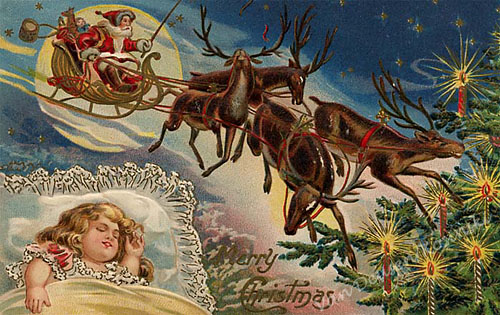
Two more reindeer stories that you might be interested in.
That handwritten note on the Troy Sentinel Broadsheet might just be a smoking gun
against Moore.
And there's a story I was told after Don's book came out. I was awakened one morning by an enthusiastic gentleman, Robert Hancock, with a wonderful story about
Dunder and Blixem. Laurence Hancock, his father and a judge then still on the New York bench, had been
a friend of an Episcopalian priest and Henry descendant, Father Harold Thomas. I had already received one letter from someone else who
wanted to tell us about this wonderful man.
The story with which Father Thomas had frequently regaled his
friends was about Henry's authorship of the poem.
The names of the reindeer, Father Thomas had
said, were those of the horses in Henry's stable!
Now that would have set me back on my heels if I weren't
already flat on my back. What a wonderful way to wake up. The idea was simply perfect and felt so right.
But my attempts, and those of my cousin Steve, to follow this particular thread have, so far, led nowhere. A
pointer to another Henry descendant, Maud Katzenbach, brought out more anecdotes of Father Thomas,
but she and her sister had been too young to be interested in an old man's stories, and had paid them no
mind. Henry's Day Book was no help because when thinking about the horses as sources of debt or credit,
Henry used descriptions rather than names.
Feb 28 '75 Gave my black horse to John Van Kleeck for a pied Mare and £6 to boot. If I dislike her I am to
return her.
But we're not giving up the search for more information.



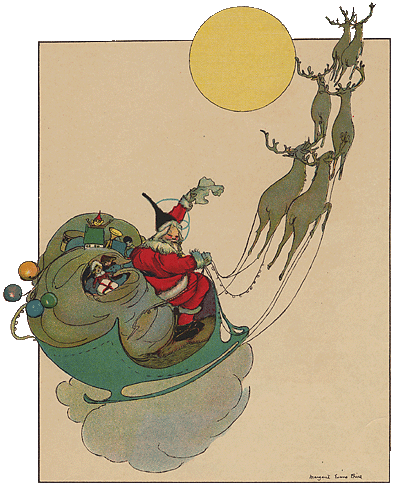
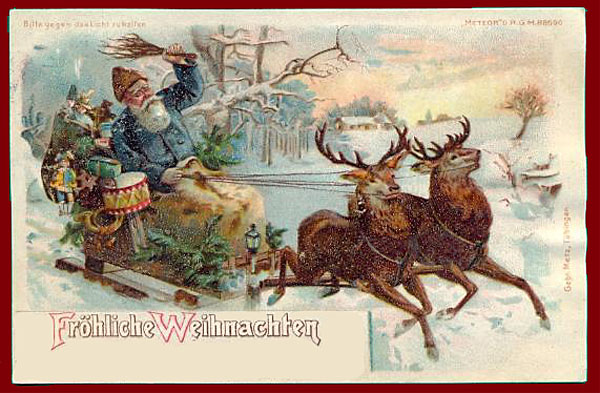

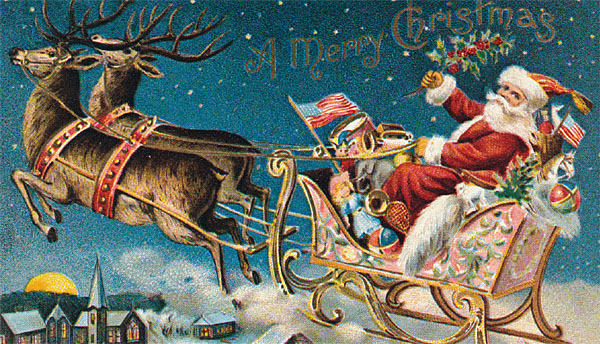
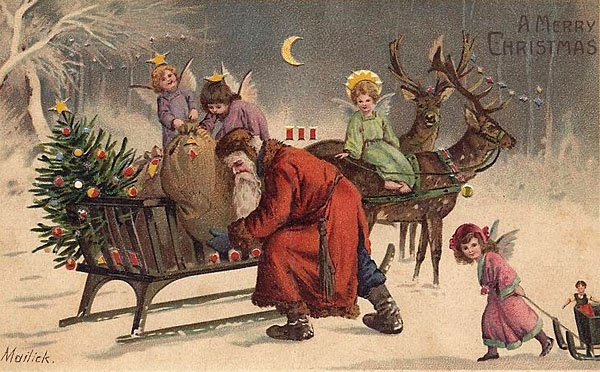
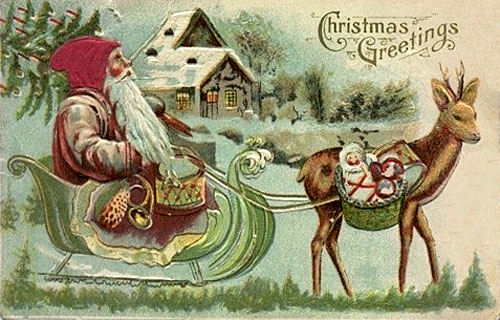
 65 TV Xmas Music Videos
65 TV Xmas Music Videos Antique Illustrations to musical NBC Recitation
Antique Illustrations to musical NBC Recitation CBS Good Morning America, 2000
CBS Good Morning America, 2000![]() Comic Book Poetry with antique postcards
Comic Book Poetry with antique postcards The Poem's Story in Anapest
The Poem's Story in Anapest![]() Antique Illustrated Editions
Antique Illustrated Editions![]() Antique Santa Postcards
Antique Santa Postcards![]()